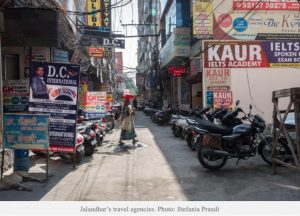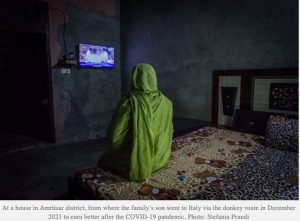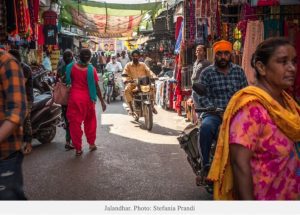Jalandhar (India) and Latina (Italy): Last November, at the time when Non-Resident Indians (NRIs) usually head home to India for eagerly awaited family reunions, seven Punjabi immigrants in Italy led a protest against the fake travel agents in India who had brought them from Punjab to the province of Latina.
The hapless young men marched to the provincial command of the carabinieri (police) and shared the nightmare they had been through on the ‘donkey route’ or illegal immigration route to Italy that had been organised by the fake travel agents. They had paid these traffickers anywhere between Rs 8 lakhs and Rs 21 lakhs to get to Italy, but then had found themselves trapped and exploited in the kiwi farms of Latina.
Even as these seven men protested, thousands of young people across Punjab were gathering funds and documents in preparation for emigration. Many of them would later learn that the travel agencies they trusted had set them on donkey routes to Italy too.
‘An alarming trend’
Given that Punjab is grappling with the issues of a drug menace, an agrarian crisis and a high rate of unemployment, it is no surprise that the state has seen a 25% to 30% increase in the establishment of travel agencies over the last few years, according to Kuljit Singh Hayer, president of the Punjab Travel Agents Association.
“This is because of the rise in student visa and work visa options available in countries like Canada, Australia, the US and the UK, among others,” Hayer said.
But the state has seen an even bigger boom in fake travel agencies, particularly in the rural areas of Punjab, where brokers send young men and women to countries like Romania, Serbia, Malta and even war-affected Ukraine, from where the donkey routes take them to western Europe.
“This is an alarming trend and it has been flourishing right under the noses of the administration and the police,” said Hayer.
According to data from the Punjab government, there are more than 7,200 travel agents across the state. The Punjab Travel Agents Association has 105 registered travel agents as its members, while Jalandhar district alone accounts for more than 1,400 travel agents.
But nobody knows how many fake travel agencies exist and who the people behind them may be. They only know that these agencies move from village to village, staying at each one only for a short time.
Hayer believes that the only way to keep track of fake travel agents in the villages is to involve the village heads or sarpanches.”The sarpanches should inform the police about any fake travel agent or touts operating from their villages,” Hayer said. “Such illegal travel agents operate from houses, not offices. The Punjab police should be more efficient in villages.”
In the mean time, it is difficult for anyone to know what they’re getting into when they visit a travel agency with the intention of moving or working abroad.
To understand the situation on the ground, correspondents from India’s The Wire and Italy’s Irpi Media went to six travel agencies and spoke to a cross section of travel agents in Jalandhar and Phagwara, posing as relatives of potential emigrants.
The Maltese route
In a small travel agency in Jalandhar, a consultant explained that if a person wanted to get to Italy, he or she should first apply for a work visa for Malta, an island country in the Mediterranean Sea.
The Schengen work permit, valid in all the countries of the European Union (EU), will then ensure entry to Italy. “There is no other legal way to get into Italy for the next three years,” the consultant said. “Visas to Italy are just not available.”
According to the consultant, the travel agency had contracts with companies in Malta that were looking for delivery men, construction workers, masons, plumbers, welders, electricians, shuttering carpenters and female cleaners, each offering a salary of 1,000 to 1,500 euros (Rs 1 lakh to 1.5 lakhs), including commission, food and accommodation. “People aged 18 to 45 are eligible to apply,” she said.

When asked if the Maltese companies, work permits and jobs are all legal, the consultant said, “Everything is legal. The applicants’ cases are forwarded to a visa facilitation office. We take the applicant’s documents and within 40 days, the Maltese city or company issues the invitation, work visa and appointment letter.”
To get to Malta however, the applicant will have to spend Rs 8.5 lakhs. “It will be a two-year contract and after we prepare the applicant’s file, the client himself will submit it to the embassy,” said the consultant.”Once the candidate gets the documents from Malta, he or she will have to submit Rs 1 lakh. The remaining amount can be paid later.”
To prove the success rate of the Malta visa, the consultant pointed to a small board where photocopies of the passports of successful applicants were displayed. “We send boys to Malta almost every month and half,” she said.
The Balkan donkey routes
Romania and Serbia are the starting points of two of the major donkey routes to Italy. Many illegal Punjabi migrants in Italy started their own journeys to Italy from Romania, thanks to travel agents in Punjab.
In Jalandhar, a travel agent in a lavishly decorated office said that going to Romania on a work visa would be the best way for a person to legally enter Italy.“Our work is genuine,” the agent said. “We don’t deal with donkey route cases.”
When asked about the kind of companies and jobs available in Romania, the agent dodged the query. He said that the jobs available depended on the demand in Romania. But he added that emigrants would mostly work at supermarkets and plastics and electronics factories.
Later, it was learned that this agency generally hired young men for the positions of furniture carpenters, masons, steel fixers and plaster masons at a salary of USD 550 a month. Young women were offered tailoring jobs for a salary of USD 429, including USD 117 for food.
The agent also recommended jobs in Croatia. Two year work visas were available for furniture carpenters and brick and tile masons at a salary of USD 750. The applicants were supposed to introduce themselves to their employers in a small video.
“Many girls and boys from my village have gone to Romania,” the agent said. “Work visas are available for boys, girls and couples.” However, he admitted that fewer girls emigrate by themselves.

When asked whether working in Romania would help a person move to Italy, the agent said that many Indians had moved to Italy from Romania. “We provide work visas for Romania and some Middle East countries. But after reaching Romania, if someone wishes to move to another country, it is his prerogative,” he said.
Whether these jobs are legitimate or not is a question that can only be answered when the applicants actually get to Romania. But many Punjabi farm workers in Italy actually started their emigration journeys by accepting jobs in Romania and then discovering when they got there that no such jobs existed.
“We were hired by an electronics company in Romania. But after reaching Romania, we realised that the company was a sham and there were no proper facilities for work, food, lodging and travel,” said Satwinder Singh, a worker at a kiwi farm in Latina. “When we pressured the owners of the company for work, they asked us to move to another company. The second company compounded our problems even further.”
Since they were already in Romania, Satwinder and his friend Kamaljit Singh decided to take the donkey route to Italy. “We were trapped by the travel agents, who robbed us of our passports and belongings. We reached Italy without a single legal document and since then we have faced one misery after another,” they said.“No one should come to Italy illegally.”
The Poland or Portugal or Netherlands route
At a travel agency in Phagwara town of Kapurthala district, the agent was overwhelmed with emigration-related work. The conversation with him was frequently interrupted by applicants turning up and phoning with queries regarding files, visas and work permits.
In the midst of this, agent said that they had contracts with 60 companies in Europe, via which people were able to enter all 26 EU countries including Italy.
“Once you are in Europe, you can go anywhere,” he said.”We strike the deal, the applicant pays the fees and then he can get a visa for Poland, Switzerland, the Netherlands, Portugal – any of the Schengen countries.”
While the agent refused to share any information about the kind of companies he was dealing with, he emphasised that these companies provided jobs and facilities for food.
“Within four months, a person can get a Schengen visa. The whole process costs Rs 13.5 lakhs,” the agent said.”Or we can send the person to one of the countries surrounding the European Union, such as Croatia, for half the cost. But after that, the applicant will have to make it to the EU countries on his own. However, the point is that you can reach Italy through these routes.”
When asked about reports that people have been duped by travel agencies, he replied: “I cannot speak about others, but we have been in this business for 28 years now. We recently sent boys to Portugal. The idea is to get a Schengen visa and then settle wherever you want.”
The Ukrainian donkey route
At another travel agency in a high rise building in Phagwara, the agent said he could offer various options for people wanting to migrate to Europe and it would cost somewhere close to Rs 15 lakhs.
When asked specifically about a visa for Italy, the agent said: “Can your applicant go in ‘Number Two’? (No. 2 is slang for an illegal route.) If not, we can provide a study visa for Ukraine, from where the person can move to Italy.”
When we pointed out Ukraine is currently at that war with Russia, the agent said emphatically, “No, no, the war is over. They have struck a deal. See, we just got visas for Ukraine.”
According to the agent, Ukraine is part of the EU and thus a Schengen country. [This is incorrect: Ukraine has applied for membership of the EU and has been accepted as a candidate for accession. But it has yet to become a member of the EU.] “Even when war broke out between Ukraine and Russia, all the people who had gone to Ukraine managed to move to Italy via Poland,” the agent continued.”They all are settled in Italy now.”

In this agent’s opinion, travel agencies that offer work visas for Romania as a means to get to Italy are a sham. Ukraine is the best way, he insisted. “We will provide you with a Ukraine visa. From Ukraine, your applicant will go to Cyprus and from there, our men will take him to Italy via the Poland border by car. It is all legal,” the agent said. He also said that there is no possibility of sending people to Italy via agricultural companies.
“Let me be very clear. A Europe visa is not available anywhere. A Schengen visa is not available. The Italy, US and UK embassies are not giving appointments,” the agent said.”But we have ways to send people to Italy. You just need to pay us Rs 13 to Rs 14 lakhs to get to Italy legally via Ukraine.”
As if this was not enough, a young man in his mid-twenties who had followed us from one travel agency to the other in Phagwara, approached us with a deal of Rs 15 lakhs for a donkey route to Italy via Serbia, assuring us that the person operating the travel and visa facility was well-equipped with resources. However, he refused to divulge any information about the person operating the nexus. “You please come to our village and then we can settle the deal,” said young man.
Interestingly, he too had been seeking a way to move abroad. In this process, he found himself broking deals for other emigrants and finding potential clients for fake agents in and around Phagwara and Jalandhar.
“Don’t worry, your work will be done. Just make up your mind and come to our village. Your person will reach Italy. I am just a call away,” he said, after sharing his phone number.
Tracking travel agents
In 2012, when Parkash Singh Badal was the chief minister of Punjab, he enacted a law titled the Punjab Travel Professionals Regulations Act.
“The Punjab and Haryana High Court had directed the Punjab government to make a strict law for these fake travel agents,” recalls Hayer. “Earlier, only section 420 of the Indian Penal Code (IPC) could be applied to fake travel agents, but that is a bailable offence. Initially, the Punjab government wasn’t serious about it.”
Jalandhar-based lawyer Satnam Singh, who has been dealing with fake travel agent cases, said there are three laws under which travel agent fraud can be prosecuted.
The Punjab Travel Professionals’ Regulation Act, 2012: This Act aims to regulate travel agents, International English Language Testing System coaching institutes, ticketing agents and airline general sales agents to check and curb illegal and fraudulent activities as well as the malpractices of persons involved in organised human smuggling in Punjab.
The Emigration Act, 1983:This Act was passed to consolidate and amend the law relating to the emigration of citizens of India.
The Punjab Prevention of Human Smuggling Act, 2012: This Act also regulates travel agents with a view to check and curb illegal and fraudulent activities and malpractices of persons involved in organised human smuggling.
However, though these laws can tackle human smuggling and fake travel agents, Punjab has been unable to deal with the problem for two reasons. One: Very few victims of fraud complain, and two: Police investigations tend to be tardy.
According to Satnam Singh, fake travel agents generally operate by making their clients sign blank sheets of stamp paper which are then converted into legal documents by a lawyer. “The stamp papers might mention, say, Rs 10,000 as the agent’s fee, when in reality the agent has charged the client lakhs of rupees,” said Satnam Singh.”The document includes terms and conditions that mention that the agent is providing a service and charging a fee.”
The agent never provides the client with a receipt, nor does the client ever ask for a receipt,” said the lawyer. “This trend has gone unnoticed for a long time. Even registered travel agents never give receipts for cash payments. This is why we hear of rampant fraud.”

He also pointed out that in Punjab, only 10% percent of all travel agents have licences. “The major reason for this is that no one moves complaints against the fake travel agents,” he said.”People apply for visas and if they arrive in the country of their choice, they guide others to approach the same agent. If they are duped, instead of approaching the police they prefer to reach a compromise with the agent and apply for a visa again through some other agent. This negates any chance of the authorities to track fake agents.”
Most people who suffer fraud avoid bringing the police into the picture because litigation in India is a prolonged process. The police themselves are overworked with older cases for the same reason, making it difficult for them to follow up new cases.
Action against frauds committed by travel agents can be taken under sections 406 (breach of trust) and 420 (inducement and cheating) of the IPC, section 24 of the Immigration Act (fake visa or document), and the Punjab Travel Agents Act (to register yourself as agent). “The deputy commissioner has the power to seal a travel agent’s office or he can direct a sub divisional magistrate rank officer to take action,” said Satnam Singh.
The lawyer believes that the NRI police stations operating in Punjab should expand their functioning to include travel agent fraud. “Generally, they deal with crime, marriage and property disputes of NRIs. But if a dedicated team of officers is deputed to track such frauds, this problem can be controlled to some extent,” he said.“A fake travel agent, if arrested, can get a three to seven year jail sentence. But unless someone files a complaint, how can the police act?”
To control this menace, Satnam Singh suggested that special awareness camps should be held in villages, towns and cities. “The District Legal Services Authority, which creates awareness among people about their rights, should conduct seminars on this issue,” he said.
Kuldeep Singh Dhaliwal, Punjab’s NRI Affairs minister, admitted that he has no idea how many fake travel agents operate in Punjab, but said he has directed the Punjab police to crack down on such cases.
“Though we are working in this direction, a lot needs to be done,” the minister said, asking The Wire to share details of this investigation to help the government track illegal travel agents.
“Cases of human trafficking of women from Punjab’s Doaba region to Arab countries are also on the rise. Recently, we had some trafficked women released from the Gulf countries, where they had been working as domestic aides,” Dhaliwal said.
Nearly 90% of Punjabi emigrants to European countries, particularly Italy, are from the Doaba region of Punjab.
This investigation has been conducted jointly by The Wire, Danwatch and IRPI Media with the support of the Journalismfund Europe.
